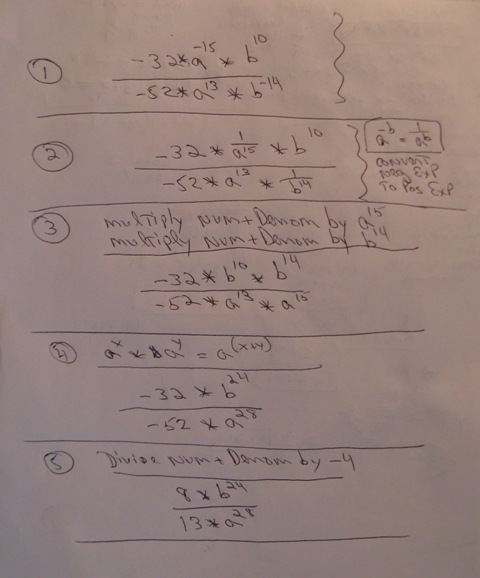Question 421895: I can't quite understand where I am going wrong.
-32a^-15b^10/-52a^13b^-14
I had answered it as 8b^4/13a^2
Wouldn't you change the places of the original exponents to make them positive and then subtract since you are dividing? The correct answer is 8b^24/13a^28. I cannot seem to grasp this idea of the negative exponents. I know you have to change the places to make them psoitive and that is what I had done. But it was marked wrong. This is the topic that is holding me back.
Thank You
Found 2 solutions by ewatrrr, Theo:
Answer by ewatrrr(24785)   (Show Source): (Show Source):
Answer by Theo(13342)   (Show Source): (Show Source):
You can put this solution on YOUR website! you have -32a^(-15) * b^10 divided by -52a^13 * b^(-14)
with exponents, a^x / a^y = a^(x-y)
using this in your equation, we get:
a^(-15) / a^13) = a^(-15-13) which equals a^(-28)
we also get:
b^10 / b^(-14) = b^(10 - (-14)) which equals b^(24)
your equation becomes:
-32 * a^(-28) * b^24 divided by -52
since a^(-28) is equivalent to 1/a^28, you can rewrite this equation to be:
-32 * b^24 divided by -52 * a^28
if you divided both numerator and denominator by 4, you will get:
-8 * b^24 divided by -13 * a^28
since a minus divided by a minus gets you a plus, you can rewrite this equation to be:
8*b^24 divided by 13 * a^28
you could also have converted all the exponents to positive form in the beginning.
if you did that, you would have gotten:
original equation:
-32a^(-15) * b^10 divided by -52a^13 * b^(-14)
since a^(-15) = 1/a^15, then that term is moved to the denominator.
since b^(-14) is equal to 1/b^14, then that term is moved to the numerator.
your equation becomes:
-32 * b^10 * b^14 divided by -52 * a^13 * a^15
since b^10 * b^14 equals b^(10 + 14), and since a^13 * a^15 equals a^(13 + 15), then you get:
-32 * b^24 divided by -52 * a^28
divided numerator and denominator of this equation by -4 and you get:
8 * b^24 divided by 13 * a^28
this might be easier to see on paper.
check out the following picture.

in step 1, i copied the original problem.
in step 2, i converted all terms with negative exponents to equivalent terms with positive exponents.
a^(-15) became 1/a^15
b^(-14) became 1/b^14
in step 3, i multiplied numerator and denominator by a^15.
this eliminated 1/a^15 from the numerator and inserted a^15 in the denominator.
also in step 3, multiplied numerator and denominator by b^14.
this eliminated 1/b^14 from the denominator and inserted b^14 in the numerator.
once you get the hang of it, you can skip the intermediate step and go directly to the final result, which is to replace a^-15 in the numerator with a^15 in the denominator, and to replace b^-14 in the denominator with b^14 in the numerator.
unless you feel comfortable with skipping the intermediate steps, i wouldn't recommend skipping them in the beginning.
in step 4 i used the fact that x^a * x^b = x^(a+b) to combine the like terms.
this allowed me to make b^10 * b^14 equal to b^(10+14) equal to b^24.
this also allowed me to make a^13 * a^15 equal to a^(13+15) equal to a^28
in step 5 i divided both numerator and denominator by -4 to simplify the fraction and reduce it to lowest terms.
|
|
|